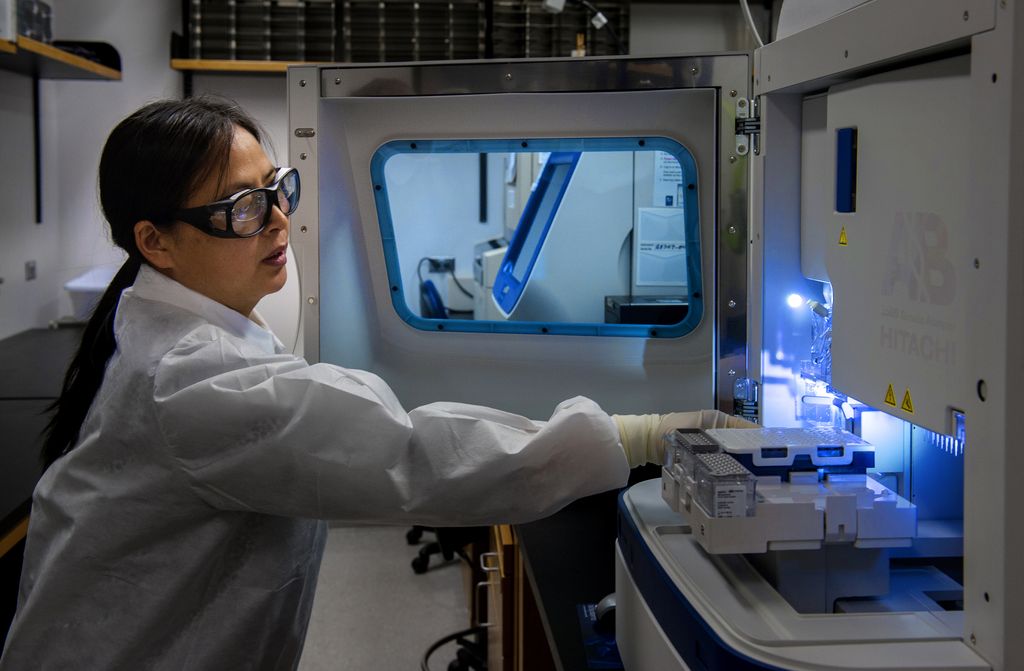Biotechnology chemical firms face numerous challenges when it comes to getting paid for their products and services. From lack of payment transparency to disputes over payment terms, these firms often struggle to receive timely and fair compensation. In this article, we will explore the challenges faced by biotechnology chemical firms in getting paid, strategies for overcoming payment issues, the impact of late payments on these firms, and the legal and regulatory considerations they need to be aware of. Read on to learn more about the struggles faced by biotechnology chemical firms and how they can navigate these challenges.
Key Takeaways
- Biotechnology chemical firms face challenges such as lack of payment transparency, delayed payments, disputes over payment terms, and financial risks.
- Strategies for overcoming payment issues include improving payment processes, negotiating favorable payment terms, implementing credit risk management, and diversifying the customer base.
- Late payments can have a significant impact on biotechnology chemical firms, leading to cash flow constraints, reduced research and development, strain on supplier relationships, and opportunity costs.
- Legal and regulatory considerations for biotechnology chemical firms include contractual agreements, intellectual property protection, compliance with payment laws, and dispute resolution mechanisms.
The Challenges Faced by Biotechnology Chemical Firms
Lack of Payment Transparency
Biotechnology chemical firms often face challenges when it comes to payment transparency. Lack of visibility into payment processes can lead to confusion and delays in receiving payment for products and services rendered. Without clear and transparent payment systems, it becomes difficult for these firms to track and reconcile invoices, resulting in potential financial losses. Additionally, the lack of transparency can create an environment where disputes over payment amounts and terms are more likely to occur.
Delayed Payments
Delayed payments can have a significant impact on biotechnology chemical firms. It can create cash flow constraints, making it difficult for companies to meet their financial obligations and invest in research and development. Additionally, delayed payments can strain relationships with suppliers, leading to potential disruptions in the supply chain. Moreover, the opportunity costs of delayed payments can be substantial, as firms may miss out on potential business opportunities. To mitigate the impact of delayed payments, biotechnology chemical firms should implement effective payment processes, negotiate favorable payment terms, and consider diversifying their customer base.
Disputes over Payment Terms
Disputes over payment terms can create significant challenges for biotechnology chemical firms. These disputes often arise when there is a lack of clarity or agreement on the agreed-upon payment terms between the firm and its customers. It is crucial for biotechnology chemical firms to establish clear and detailed payment terms in their contracts to avoid potential disputes.
In some cases, disputes over payment terms can lead to delays in receiving payment, which can have a negative impact on the firm’s cash flow. This can result in financial strain and difficulties in meeting other financial obligations, such as paying suppliers or investing in research and development.
To mitigate the risk of disputes over payment terms, biotechnology chemical firms should consider implementing the following strategies:
- Clearly define payment terms in contracts and ensure both parties have a shared understanding of the terms.
- Regularly communicate with customers to address any potential issues or concerns regarding payment terms.
- Establish a dispute resolution mechanism to handle any disputes that may arise.
By proactively addressing potential disputes over payment terms, biotechnology chemical firms can minimize financial risks and maintain healthy relationships with their customers.
Financial Risks and Uncertainty
Biotechnology chemical firms face significant financial risks and uncertainty in their operations. These risks can arise from various factors, including market volatility, regulatory changes, and the high costs of research and development. Financial risks can have a detrimental impact on the profitability and sustainability of these firms. It is crucial for biotechnology chemical firms to carefully manage and mitigate these risks to ensure their long-term success.
One important strategy for managing financial risks is to diversify the customer base. By expanding their client portfolio, biotechnology chemical firms can reduce their dependence on a single customer or market segment. This helps to mitigate the risk of revenue loss in case of a downturn or disruption in a specific market. Diversification also allows firms to tap into new opportunities and explore different revenue streams.
Another key aspect of managing financial risks is implementing effective credit risk management practices. This involves assessing the creditworthiness of customers and suppliers, setting appropriate credit limits, and closely monitoring payment behaviors. By proactively managing credit risks, biotechnology chemical firms can minimize the likelihood of non-payment or delayed payments, which can significantly impact their cash flow and financial stability.
In addition, biotechnology chemical firms should consider hedging strategies to mitigate financial risks associated with market volatility. Hedging involves using financial instruments, such as futures contracts or options, to protect against adverse price movements in raw materials or finished products. This helps to stabilize revenues and protect profit margins, especially in industries where prices can fluctuate significantly.
Overall, biotechnology chemical firms must be proactive in identifying and managing financial risks. By diversifying their customer base, implementing effective credit risk management practices, and utilizing hedging strategies, these firms can navigate the challenges of financial uncertainty and ensure their long-term viability.
Strategies for Overcoming Payment Issues
Improving Payment Processes
Improving payment processes is crucial for biotechnology chemical firms to ensure timely and efficient transactions. By streamlining invoicing and payment collection, companies can minimize delays and avoid cash flow constraints. Implementing automated payment systems can also reduce human errors and improve accuracy. Additionally, establishing clear payment terms and policies can help prevent disputes and ensure transparency. By prioritizing efficient payment processes, biotechnology chemical firms can enhance financial stability and maintain strong relationships with suppliers and customers.
Negotiating Favorable Payment Terms
When negotiating payment terms, biotechnology chemical firms should consider the following strategies:
- Proactively engage with customers to discuss payment terms that are mutually beneficial.
- Seek flexibility in payment schedules to accommodate cash flow fluctuations.
- Negotiate discounts for early or bulk payments.
- Include penalty clauses for late payments to incentivize timely payments.
- Establish clear payment milestones to ensure transparency and accountability.
By implementing these strategies, biotechnology chemical firms can improve their cash flow, reduce financial risks, and maintain positive relationships with customers.
Implementing Credit Risk Management
Implementing effective credit risk management strategies is crucial for biotechnology chemical firms to mitigate financial risks and ensure timely payments. One important aspect of credit risk management is assessing the creditworthiness of customers before extending credit. This can be done by analyzing their financial statements, credit history, and industry reputation. Additionally, establishing clear credit policies and procedures, such as setting credit limits and terms, can help minimize the risk of non-payment. Regular monitoring of customer payment behavior and prompt follow-up on overdue payments are also essential to identify potential credit risks and take appropriate actions. By implementing robust credit risk management practices, biotechnology chemical firms can protect their cash flow, maintain healthy customer relationships, and minimize the impact of late payments.
Diversifying Customer Base
Diversifying the customer base is a crucial strategy for biotechnology chemical firms. By expanding their reach to new markets and industries, these firms can reduce their reliance on a single customer or sector. This not only helps to mitigate the risks associated with fluctuations in demand, but also opens up new opportunities for growth and innovation. Exploring untapped markets and forging partnerships with diverse customers can lead to a more stable and sustainable business model.
The Impact of Late Payments on Biotechnology Chemical Firms
Cash Flow Constraints
Cash flow constraints can severely impact the operations of biotechnology chemical firms. Limited funds can hinder their ability to invest in research and development, purchase necessary equipment, and hire skilled personnel. This can result in a slowdown in innovation and hinder the company’s growth potential. Additionally, cash flow constraints can strain relationships with suppliers, as delayed payments may lead to disruptions in the supply chain. It is crucial for biotechnology chemical firms to effectively manage their cash flow to ensure smooth operations and maintain a competitive edge.
Reduced Research and Development
Late payments can have a detrimental effect on the research and development (R&D) efforts of biotechnology chemical firms. Funding delays caused by late payments can disrupt ongoing projects and hinder the progress of new discoveries. Without timely payments, firms may struggle to allocate resources for essential R&D activities, such as hiring skilled researchers, purchasing necessary equipment, and conducting experiments. This can lead to a slowdown in innovation and a loss of competitive advantage in the biotechnology industry.
Supplier Relationship Strain
Maintaining strong relationships with suppliers is crucial for biotechnology chemical firms. Effective supplier relationship management ensures access to high-quality raw materials and timely deliveries. It also allows firms to negotiate better pricing and terms, reducing costs and improving profitability. Building enduring ties with suppliers requires open communication, trust, and mutual understanding. Regularly evaluating supplier performance and addressing any issues promptly helps prevent strain in the relationship. By prioritizing supplier relationships, biotechnology chemical firms can mitigate the risks associated with delayed payments and ensure a steady supply chain.
Opportunity Costs
Late payments can have significant financial implications for biotechnology chemical firms. The delay in receiving payment can lead to cash flow constraints, making it difficult for companies to meet their financial obligations and invest in research and development. As a result, innovation and product development may be hindered, limiting the firm’s ability to stay competitive in the market. Additionally, the strain on supplier relationships caused by late payments can result in higher costs and reduced access to essential resources. Biotechnology chemical firms must carefully consider the opportunity costs of late payments and implement strategies to mitigate these risks.
Legal and Regulatory Considerations for Biotechnology Chemical Firms
Contractual Agreements
When entering into contractual agreements, biotechnology chemical firms need to consider various legal and regulatory factors. These factors include ensuring compliance with payment laws, protecting intellectual property, and establishing dispute resolution mechanisms. Contractual agreements play a crucial role in defining the rights and obligations of both parties involved. It is important for biotechnology chemical firms to carefully review and negotiate the terms of these agreements to protect their interests and mitigate potential risks.
Intellectual Property Protection
When it comes to protecting intellectual property in the biotechnology and chemical industries, it is crucial for firms to take proactive measures. One important aspect is assessing freedom to operate in the chemical, biotech, and pharma fields. This involves identifying potential problem rights and taking the necessary steps to invalidate them. By doing so, firms can safeguard their innovations and avoid legal disputes.
In addition, firms should consider implementing contractual agreements that clearly define ownership and usage rights of intellectual property. This helps establish a solid foundation for protecting valuable assets and preventing unauthorized use or infringement.
To further enhance intellectual property protection, firms can also explore the option of obtaining patents or trademarks for their innovations. These legal protections provide exclusive rights and prevent others from using or profiting from the protected inventions.
It is important for biotechnology chemical firms to prioritize intellectual property protection as it plays a crucial role in maintaining a competitive edge and ensuring long-term success in the industry.
Compliance with Payment Laws
Biotechnology chemical firms must ensure compliance with payment laws to avoid legal consequences. This includes adhering to regulations related to invoicing, payment terms, and dispute resolution. Failure to comply with these laws can result in fines, penalties, and damage to the firm’s reputation. It is crucial for biotechnology chemical firms to stay updated on any changes in payment regulations and seek legal advice if needed.
To ensure compliance, firms can:
- Regularly review and update their payment policies and procedures
- Train employees on payment laws and regulations
- Maintain accurate records of payment transactions
- Seek professional assistance in interpreting and implementing payment laws
Tip: Keeping up with payment laws is essential for the long-term success and sustainability of biotechnology chemical firms.
Dispute Resolution Mechanisms
Dispute resolution in the biotechnology chemical industry involves various strategies to resolve conflicts and reach a satisfactory outcome. Some common mechanisms include:
- Daily Phone Calls: Our collectors make daily phone calls for the first 14 to 21 days to contact the debtor.
- Demand Letters: Legal demand letters are sent to the debtor to emphasize the seriousness of the situation.
- Skip Tracing: If initial attempts fail, we employ skip tracing techniques to locate the debtor.
- Settlement Negotiations: Skilled negotiators mediate disputed claims to avoid the costly expense of a private mediator.
These mechanisms are designed to ensure a fair resolution and protect the interests of biotechnology chemical firms.
In the field of biotechnology chemicals, it is crucial for firms to navigate the complex landscape of legal and regulatory considerations. Compliance with laws and regulations is essential to ensure the safety and effectiveness of biotechnology products. From obtaining necessary permits and licenses to adhering to environmental and health regulations, biotechnology chemical firms must stay up-to-date with the ever-changing legal requirements. Failure to comply with these regulations can result in severe penalties and damage to the reputation of the company. At Debt Collectors International, we understand the importance of compliance in the biotechnology industry. Our debt collection solutions can help biotechnology chemical firms recover outstanding debts while ensuring full compliance with legal and regulatory requirements. Contact us today to learn more about how we can simplify debt collections for your firm.
Frequently Asked Questions
1. How do biotechnology chemical firms face challenges in getting paid?
Biotechnology chemical firms face challenges in getting paid due to lack of payment transparency, delayed payments, disputes over payment terms, and financial risks and uncertainty.
2. What are some strategies for overcoming payment issues?
Some strategies for overcoming payment issues include improving payment processes, negotiating favorable payment terms, implementing credit risk management, and diversifying customer base.
3. What is the impact of late payments on biotechnology chemical firms?
Late payments can lead to cash flow constraints, reduced research and development capabilities, strain on supplier relationships, and opportunity costs for biotechnology chemical firms.
4. What legal and regulatory considerations should biotechnology chemical firms be aware of?
Biotechnology chemical firms should be aware of contractual agreements, intellectual property protection, compliance with payment laws, and dispute resolution mechanisms.
5. How can biotechnology chemical firms improve payment processes?
Biotechnology chemical firms can improve payment processes by implementing digital payment systems, streamlining invoicing and billing procedures, and adopting automated payment reminders.
6. Why is it important for biotechnology chemical firms to diversify their customer base?
Diversifying the customer base helps biotechnology chemical firms reduce dependency on a single customer and mitigate the risks associated with non-payment or delayed payments.





